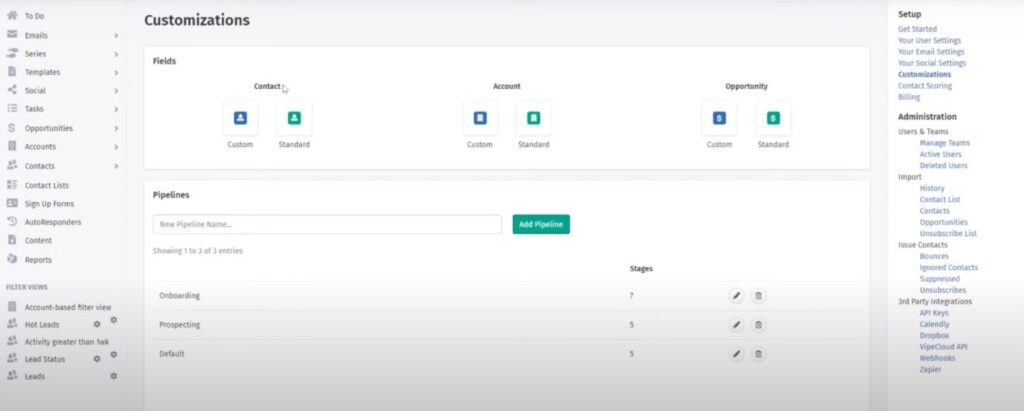Last updated on August 7th, 2023

Collecting data incorrectly could make you miss out on revenue when marketing and selling. This covers expert ways to use CRM fields for better business outcomes.
Your CRM comes with valuable capabilities that help with personalization and staying organized.
These components are called CRM fields.
They’re essential for the customer journey and for accurate, usable data.
Without using these fields at all, you may miss out on the FULL benefits of having a customer relationship management system.
This guide gives you a clear breakdown of what CRM fields are, why they matter, and how you can easily use them to sell more effectively.
Table of Contents:
- What Are CRM Fields?
- 9 Important CRM Fields For Sales And Marketing
- Why Are CRM Fields Important?
- What Is Field Validation?
- What Are Custom Fields?
- 16 Custom Field Ideas For Different Parts Of Your CRM
- Tips to Help Keep CRM Fields Up-To-Date
- Summary Of CRM Fields

VipeCloud is the only Automation tool your small business needs to
be the hero to your customers.
With Email, Texting, Social, Suites, Chat, Stories, Video Email & Sign Up Forms fully built-in, we provide you with the perfect platform to grow your business.
15 Day Free Trial – Get started risk free. No CC needed.
What Are CRM Fields?
CRM fields are datatypes that hold information for you to use later on
CRM has them available for use in your forms, pipelines, texts, emails, and more.
You can use both standard fields (i.e., name, email, phone number) and custom fields (fields you can create for information like birthdays, company size, etc.)
Your CRM fields need to be up-to-date with accurate information.
This is the best way for them to be of value to you.
Besides filling our CRM fields manually, you can also have customers fill out forms that sync with your CRM fields.

With forms, you can make sure your fields are valid by making them check for the right conditions.
With custom fields, you can do this by giving your field the proper datatype.
For example, say a marketing agency wants to know a client’s marketing budget on their form.
Instead of using a “text” datatype to have the client enter their budget manually, they can use a drop-down list that shows a range of budgets.
This helps them qualify for a budget range they prefer clients to have.
Let’s look closer at the different CRM data types that make up your fields in VipeCloud.
Examples Of CRM Data Types
CRM users have a variety of data types to choose from. Here’s a list that you can apply to your custom CRM fields.
- Text
- Checkbox
- Picklist
- TextArea
- Drop-down list
- Numbers
- Links
- Currency
- Tags
- Percents
- Date/time
One of the best ways to choose the right data type for your fields is by thinking about efficiency.
In other words, some data types make it easier to intake information than others.
For example, you can use tags to group customers by industry instead of a text field. Tags help you automatically search customer groups and segment them.
Efficient fields also increase the odds of your forms getting completed, especially with new audiences.
9 Important CRM Fields For Sales And Marketing
Here are essential CRM fields to consider in your sales and marketing. You can find and use these fields across your forms, pipelines, emails, and more.
- Name Of Contact And Opportunity
- Phone
- Task Type
- Contact Type
- Summary/Notes
- Lead Source
- Company Size
- Opportunity value
Why Are CRM Fields Important?
It can be frustrating for sales managers when their reps aren’t using and filling out CRM fields.
Why?
It can lead to the company missing out on the following 3 benefits:
Personalization And Better Marketing
According to Webincare, 74% of businesses say CRM software improved customer data access.
CRM fields let you house important information you can use for better personalization and relevance.
For instance, if you’re nurturing your leads, you can have their name, company, and a personalized message in different CRM fields.
Your personalized message can be a custom field that uses the “TextArea” datatype (AKA a paragraph datatype).
You can enter this custom field at the first line of your email to show your prospects that you’re providing a relevant customer experience.
Which is important because…

Personalization makes 80% of people more inclined to do business with an organization, with 90% saying personalization is desirable.
Staying Organized
CRM fields help you stay structured and organized with data.
Naming your fields based on their purpose keeps data collection simple.
And with more organized data, you set up marketing and sales automation much faster.
A faster campaign setup can help with quick client acquisition (or speeds up the time it takes to find the right approach).
Organizing your data is necessary to get insert important personalization in your workflows.
Missing out on the proper CRM fields could lead to reps working on deals with a lack of context which will hurt your conversion rates.
For instance, you or a rep may not know the lead source of some deals.
This could cause your team to:
- Not prioritize the marketing channels that are getting you the most opportunities.
Or…
- Not cut out the marketing channels that aren’t working.
Keeps Data Clean
With the required conditions and unique identifiers, your CRM data stays clean.
You can worry less about these issues, which end up hurting your workflows:
- Duplicated information
- Incorrectly entered information
- Poor formatting
With your custom fields, you should have a standard operating procedure for naming fields and assigning the proper data type to increase data quality.
What Is Field Validation?
Field validation checks to make sure that the data entered by someone matches what you’re looking for.
For instance, with a phone number data type, your system will check that numbers get entered with the correct number of digits.
(If letters or too many numbers get entered, the system will show the user an error.)
Field validation also covers unique conditions.
This form of validation checks for duplicated information (like the same email address).
The big picture with field validation is to keep your CRM data clean.
Clean CRM information makes data usable for your workflows in:
- Marketing
- Sales
- Account management
- Customer service
- Project management
What Are Custom Fields?
Custom fields are fields where you can dictate the type of information accepted.
You start by entering the name of the field and then the datatype it accepts.
Custom fields help you tailor your CRM better to your industry-specific needs.
You can focus on using your industry or company’s jargon instead of generic fields.
How To Implement Custom Fields In Your CRM
Here’s how to create a custom field using VipeCloud’s CRM:
- Start by creating a VipeCloud account
- Click your name on the upper right-hand corner
- Click “Get Started” under “Setup”
- Click “Define Customizations” under the “Data Management & CRM” section.
Creating your custom field:
1. On the customizations menu, choose whether your field is a “contact,” “account,” or “opportunity” field, then click “custom.”

2. Select the drop-down button, “Create Custom Field.”
3. Select a datatype for your custom field
4. Write a name for the field
5. Choose whether you’d like the field to be a required condition by selecting the checkbox
6. Begin using the custom field
16 Custom Field Ideas For Different Parts Of Your CRM
Adding the right custom fields in your CRM can give your company more capabilities.
Here are field ideas to consider for sales, marketing, and customer service.
Pipeline Fields
- Percentage to close
- Task by type
- Lead Status
- Opportunity source
- Stage name
Forms Fields
- Company size
- Revenue per year
- Job role
- Date of sign-up
Email Fields
- Location
- Company name
- Email Signature
- Tag
Text Fields
- Birthday
- Second mobile number
- URL (for tracking text marketing clicks)
6 Tips to Help Keep CRM Fields Up-To-Date
For some reps, keeping their CRM up-to-date can feel like a chore.
It might not be the most exciting part of sales, but it’s essential to getting the most out of your customer experience.
Here are 6 tips that you should consider making standard operating procedures (SOPs) in your company.
1. Regular Review Your Fields
Set a regular schedule for managing and updating your CRM fields.
Sometimes you only need specific fields for a short period, like for a special offer on a form.
In this instance, it would make sense to eliminate it to keep your list of fields organized.
Consider updating your fields daily, weekly, monthly, or quarterly based on CRM usage, team size, and your needs.
2. Fill Out Contact Fields To The Fullest
Filling out all possible fields for each contact helps you store as much valuable information about them as possible.
In many cases, syncing information isn’t always enough, so this might require some manual entry.
Having this in your SOPs and team training will help you to make this a consistent practice.
3. Use Tags For Grouping
Tags help you stay organized and group contacts.
You can also search a group of contacts by entering the tag they share.
Using tags is key for segmentation, especially when you’re creating marketing messaging.
Earlier, we mentioned the power of personalization and relevance.
It’s what customers want.
And it’s what you need to close deals.
Fortunately, you can give customers what it wants with the help of tags.
4. Set Tasks For Update Reminders
Tasks can remind you to maintain CRM fields from time to time.
And the best part is that tasks are easy to set up.
Task management using VipeCloud even lets you delegate to team members.
So if you designate one person to handle CRM-related activity, they can get notified.
Your team member can then check off the task as completed after they finish, keeping everyone on the same page.
5. Always Double-Check Entries
Sometimes CRM data needs to be accurate for your daily tasks to get done.
It could be an email or phone number that needs to be corrected due to a typo.
Having rules in your SOPs to double-check entries is a simple way to ensure team members enter the correct information.
6. Use Customer Notes To Update CRM
Customers can share crucial information, whether on a call or in person.
This could be an opportunity to note what they’re saying and later update your CRM.
Sometimes, customers and prospects can give you an idea of a new CRM field to create for later use.
You can go about collecting customer feedback notes in different ways:
- Call recordings
- Customer interviews
- Surveys
- Market research
- Account management instances
Summary Of CRM Fields
CRM fields help you personalize your marketing and stay organized.
Understanding the fields that matter most to you and continually keeping data clean is crucial.
The best customizable CRMs are simple to use.
VipeCloud was built for small businesses — making it easy for anyone to take advantage of using CRM to improve their customer experience.
Looking for a CRM solution that has everything you need and doesn’t cost a fortune?
Sign up for a free 15-day free trial with VipeCloud today.
Or if you’d like to learn more about how VipeCloud’s CRM can fit into your business, request a demo.
We’ll be happy to give you a walkthrough and answer all of your questions. 😊

Leave a Reply